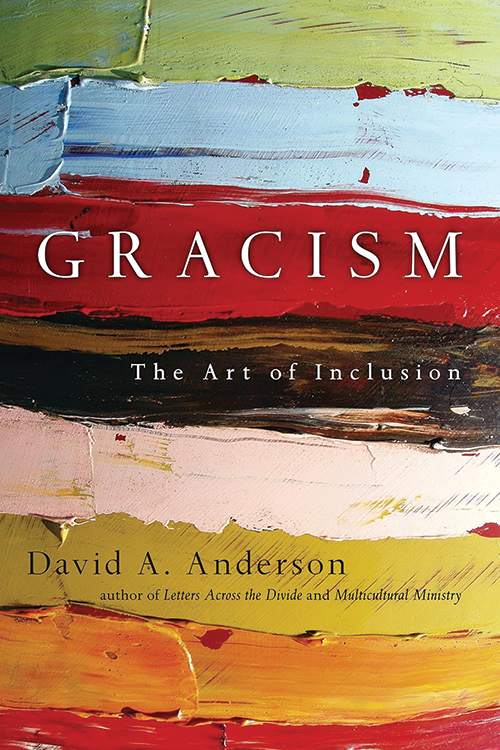
Gracism: The Art of Inclusion
Reviewed by Harvey Gillman
November 1, 2023
By David A. Anderson, revised and expanded with David Heiliger. InterVarsity Press, 2023. 192 pages. $18/paperback; $17.99/eBook.
David A. Anderson is the African American founder and senior pastor of Bridgeway Community Church in Maryland which claims over 4,000 attenders each week at its two campuses. His church aims to create a community that bridges ethnic and social divisions. As an English Friend from a very different religious background, I was fascinated to see how this form of Evangelical Christianity overlapped in so many ways with Quaker concerns and testimonies. I did have to translate several of the ideas, but though we speak different religious languages, we often are referring to the same issues.
“Gracism” means addressing racism through the lens of healing grace. Racism is a sin: “Wherever there is ethnic difference combined with a societal power imbalance, you have the potential for the destructive sin of racism.”
In some ways, the whole book feels like a sermon. The text used is 1 Corinthians 12:14–27. How is the whole body of the church cherished and valued? How are those who have been disregarded by the powerful made to feel and be fully part of the community? Anderson distinguishes between “favoritism” (when certain social aspects are given the greatest value) and “offering favor” (standing with and supporting those who are on the margins). Reflecting on the passage in 1 Corinthians, he questions how a “gracist” might be a reconciler in a divided church. He offers eight sayings based on the text: I will lift you up; I will cover you; I will share with you; I will honor you; I will stand with you; I will consider you; I will celebrate with you; I will heal with you. Most of the chapters are reflections on these sayings.
Central to his theme—and indeed his church’s concerns—is how to create a community where those who feel oppressed and those who may be identified as coming from the community of the oppressor can recognize each other as equal members of the community. From Anderson’s tradition, all are sinners and need redemption, irrespective of ethnicity and color. Overcoming sin is about seeing the world through the eyes of Christ: answering the pain and the fears even of those whose attitudes and views are diametrically opposed to your own. The whole book is a response to a divided political culture where the world is seen as divided between the good and the bad, the saved and the damned. Redemption is the aim, not condemnation.
Contemporary Liberal Quakerism tends to avoid too heavy a reliance on religious language. We do not talk up sin. We are happier to speak of testimonies, sometimes simply in terms of social values. But testimonies are a witness to and in the world to a relationship between the human and the Divine. The way we act in the world is a direct response to how we behold the Divine in the other. Our testimonies are often our sermons. We do not often talk of grace, but I do wonder how we manage to continue on gray, dark days when our energy is low and we cannot see results for all our labors. I do wonder whether our worship is a particular time when we open ourselves, not just to the recharging of our batteries but to grace: a gift we have not earned but a gift that allows us to feel there is some worth in what we are trying to achieve. Grace allows us to see, indeed gives us the strength to see, the Divine in the other. In some ways, gracism is a translation of the Quaker answering that of God in everyone.
Harvey Gillman was outreach secretary for Britain Yearly Meeting for 18 years. He has traveled widely among Friends both at home and abroad, exploring the Quaker way and reflecting on issues of spirituality, outreach, inclusivity, and hospitality, in his writings, in workshops, and retreats. His latest publication is an anthology of poems titled Epiphanies.



Comments on Friendsjournal.org may be used in the Forum of the print magazine and may be edited for length and clarity.